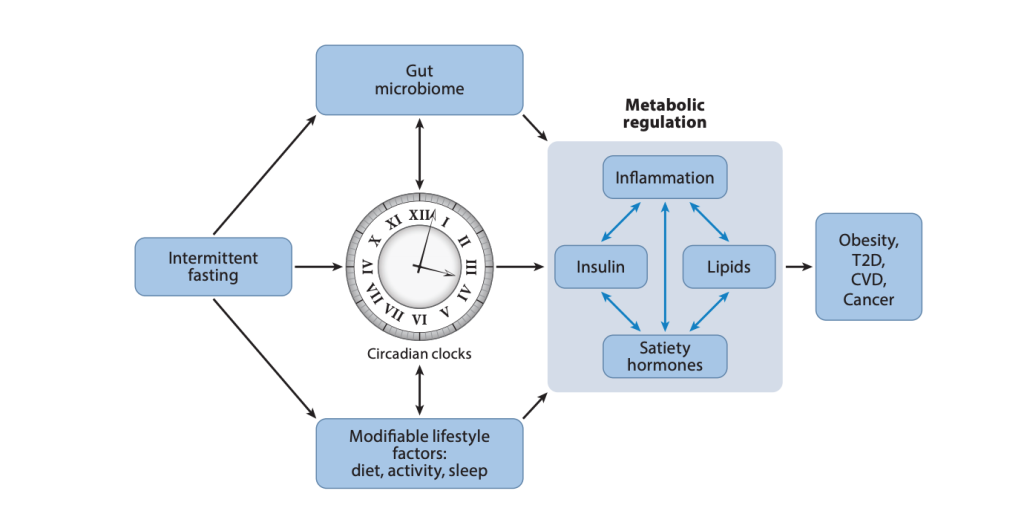INTERMITTENT FASTING
Unlock the secrets of Intermittent Fasting explore diverse fasting methods, their effects, and answers to FAQs. Discover the potential benefits and risks in our comprehensive guide.

Intermittent fasting (IF) has gained immense popularity in recent years as a promising approach to weight management, improved health, and enhanced longevity. This dietary strategy involves cycling between periods of fasting and eating. In this comprehensive guide, we will delve into the world of intermittent fasting, exploring various types of fasting plans, their impacts on metabolism, health benefits, potential risks, and much more. Whether you’re a beginner or an experienced faster, this article will provide valuable insights and answers to frequently asked questions about intermittent fasting.
TABLE OF CONTENT
What are the different types of intermittent fasting plans, and how do they vary?
Intermittent fasting isn’t a one-size-fits-all approach. There are several popular methods, each with its own unique fasting and eating windows. Let’s explore some of the most common types:
The 16/8 Method
The 16/8 method involves fasting for 16 hours and restricting eating to an 8-hour window. It’s one of the simplest and most popular forms of intermittent fasting.
The 5:2 Method
In the 5:2 method, individuals eat normally for five days of the week and limit calorie intake to around 500-600 calories on the remaining two non-consecutive days.
Eat-Stop-Eat Method
This approach includes 24-hour fasts once or twice a week. For example, you might fast from dinner one day to dinner the next.
Alternate-Day Fasting
Alternate-day fasting alternates between days of regular eating and days of fasting, during which calorie intake is severely restricted.
Warrior Diet
The Warrior Diet involves fasting for 20 hours and eating one large meal during a 4-hour eating window, typically in the evening.
OMAD (One Meal a Day)
OMAD is a strict form of fasting where you consume all your daily calories in a single meal, usually within an hour.
How does intermittent fasting impact metabolic rate
Intermittent fasting can influence your metabolism in several ways, including increased fat oxidation, improved insulin sensitivity, and enhanced autophagy. This can contribute to weight loss and better metabolic health.

What are the potential risks and benefits of intermittent fasting for weight loss?
Intermittent fasting can be an effective tool for weight management. Benefits include reduced calorie intake, improved fat loss, and preserved muscle mass. However, it may not be suitable for everyone, and there are potential risks, such as nutrient deficiencies and disordered eating patterns.
Is intermittent fasting suitable for everyone? Are there any exceptions?
While intermittent fasting can be beneficial for many, it may not be appropriate for individuals with certain medical conditions, such as eating disorders, pregnancy, or a history of severe hypoglycemia. Consulting a healthcare professional is crucial before starting an IF regimen.
How does intermittent fasting interact with exercise routines
Integrating exercise with intermittent fasting can have various effects. Timing your workouts during eating windows can help optimize muscle gain and fat loss. However, fasting may impact workout performance, so careful planning is necessary.
What are the effects of intermittent fasting on blood sugar levels?
Intermittent fasting can improve insulin sensitivity and stabilize blood sugar levels, reducing the risk of type 2 diabetes. Additionally, some evidence suggests that IF may enhance cognitive function and brain health.

How does intermittent fasting affect the gut microbiome?
IF may influence the gut microbiome positively, promoting a diverse and healthy community of gut bacteria. However, it’s essential to be mindful of potential nutritional deficiencies that can arise with prolonged fasting.
How can someone safely transition into an intermittent fasting routine?
Starting intermittent fasting requires careful planning and gradual adaptation. We’ll provide a step-by-step guide to help you make a smooth transition and avoid common pitfalls.
Does intermittent fasting have a gender bias? Does it affect men and women differently?
Research suggests that men and women may respond differently to intermittent fasting. We’ll explore these gender-specific effects and how healthcare professionals view IF as a dietary strategy.
Can intermittent fasting help in the management of chronic diseases like diabetes?
Intermittent fasting may offer potential benefits for managing chronic conditions such as diabetes. We’ll examine the latest research and its implications for individuals with these health concerns.

Is it possible to gain muscle while on an intermittent fasting plan?
Building muscle while fasting is possible but requires careful attention to nutrition and training. We’ll provide guidance on how to maximize muscle growth within an intermittent fasting framework.
What are the psychological challenges of intermittent fasting, and how can they be managed?
Intermittent fasting can pose psychological challenges, including hunger, cravings, and social pressures. We’ll offer practical strategies to overcome these obstacles and maintain a healthy relationship with food.
Can intermittent fasting improve cognitive function
Intermittent fasting has gained popularity not just for its potential weight management benefits but also for its impact on cognitive function. Research suggests that intermittent fasting can enhance brain health and cognitive performance. During fasting periods, the body enters a state of ketosis, where it relies on ketones for energy. This metabolic shift is believed to support cognitive function by providing a stable and efficient energy source for the brain. Additionally, intermittent fasting may reduce inflammation, oxidative stress, and improve insulin sensitivity, all of which can positively influence brain health. While more research is needed, incorporating intermittent fasting into your lifestyle may offer cognitive benefits in addition to its well-documented effects on overall health and well-being.
What are the nutritional deficiencies one should watch for while on an intermittent fasting diet?
While intermittent fasting (IF) can offer various health benefits, it’s essential to be mindful of potential nutritional deficiencies that may arise during this eating pattern. The most common deficiencies to watch for include vitamins and minerals such as vitamin D, vitamin B12, calcium, iron, and magnesium. Since you have limited eating windows on an IF diet, it’s crucial to ensure your meals are nutrient-dense and well-balanced. Consider consulting a healthcare professional or a registered dietitian to create a personalized plan that addresses your specific nutritional needs and helps prevent deficiencies while reaping the benefits of intermittent fasting for your overall well-being.

How do healthcare professionals view intermittent fasting?
Healthcare professionals generally view intermittent fasting as a promising approach to improving overall health and potentially aiding in weight management. Numerous studies have suggested that intermittent fasting can have positive effects on various health markers, such as reducing insulin resistance, inflammation, and even promoting autophagy, a cellular cleanup process. However, it’s essential to note that the perception of intermittent fasting can vary among healthcare providers, with some embracing it as a complementary strategy alongside conventional medical treatments, while others may approach it cautiously, especially for individuals with certain medical conditions or dietary restrictions. As with any dietary or lifestyle change, it’s crucial to consult with a healthcare professional before embarking on an intermittent fasting regimen to ensure it aligns with your specific health needs and goals.
Conclusion
Intermittent fasting is a versatile dietary strategy with the potential to positively impact various aspects of health, from weight management to metabolic health and cognitive function. However, it’s essential to choose the fasting method that suits your goals and lifestyle, and to consult with a healthcare professional if you have underlying health conditions. By understanding the different types of intermittent fasting plans and their effects, you can harness the power of this approach to achieve your health and wellness goals.
Whether you’re looking to shed a few pounds, enhance your metabolic health, or explore the cognitive benefits of fasting, intermittent fasting offers a flexible and scientifically backed way to support your journey toward a healthier, more vibrant life. As you embark on your intermittent fasting journey, remember to stay informed, stay mindful of your body’s signals, and enjoy the transformational benefits that this approach can offer.
